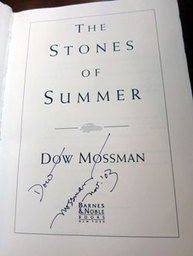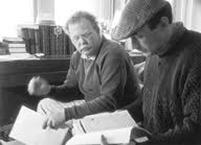 It is not often I burst into tears when receiving a gift, but that is what happened on Christmas when I opened one of Mark’s presents. First he explained that it had been a small odyssey finding this gift. He had been looking for it for years, and recently found it on two on-line catalogues in Australia; but his orders were cancelled in both cases because they didn't have the item in stock. Finally he bought it from an eBay merchant in the States, who sent it by express post to ensure arrival before Christmas (it arrived on Christmas Eve). After all that effort, Mark hoped that I would like it, but he didn't expect me to cry. He knew, at that moment, that it had all been worth it.  The parcel had the shape, feel and weight of a thick hardcover book. The first thing I saw was the author’s name, Dow Mossman, which didn’t ring any bells. Then I read the title: The Stones of Summer. Tears began to well in my eyes, followed by full-on sobbing when I turned to the first page to find that it had been signed by the author ten years ago, in November 2003. Why did I cry when given a book first published in 1972 (when I was a toddler), which had been out of print for the best part of 30 years, written by an American author no one seems to have heard of in Australia? In 2003, I went to see a documentary at the Sydney Film Festival, called The Stone Reader, by Mark Moskowitz. This film wasn't my choice (I am not too fond of documentaries) but had been picked by my SFF buddy, Monique. It turned out to be one of the best documentaries I have ever seen. I went home and told Mark the story from beginning to end, and couldn't stop talking about it for weeks. Perhaps it resonated so deeply with me because I am passionate about books – fiction in particular – and about writing. And this was a film about both. The film documented the search for Dow Mossman, who, after publishing The Stones of Summer in 1972, vanished from the face of earth. The search took two years. When Moskowitz was initially unable to find him, the documentary became an exploration of Moskowitz’s own lifelong relationship with books, and an examination of classic ‘one-off’ novels – such as The Catcher in the Rye and To Kill a Mocking Bird. These days, both readers and publishers seem to expect that authors will churn out dozens of books in a lifetime; but there a many authors who only ever wrote one complete novel. A list of such (English language) authors is here, and I suspect it’s not exhaustive. Why was Moskowitz obsessed with finding this virtually unknown author who hadn't written anything since the seventies? In 1972, Moskowitz, aged 18, rushed to buy The Stones of Summer inspired by a review he read in the New York Times Book Review. The reviewer, John Seelye, was one of many critics highly praising the book, comparing the first-time author to James Joyce, Mark Twain, JD Salinger, Philip Roth and other writers of similar calibre. At the time, Moskowitz found the book ‘impenetrable’ and gave up after twenty pages. A quarter of a century passed before he picked it up again, when he was catching a plane and didn't have anything else to read. Now in his forties, he was blown away by what he read. When he tried to find other works by this author he discovered that he hadn't published a word in the past thirty years. So he set out to find him, to ask him why.  After travelling extensively interviewing people (including John Seelye) who might have clues that would lead him to Mossman, Moskowitz did eventually find his ‘hero’, still living in Cedar Rapids, Iowa, where he lived all his life. His one and only novel, which took him ten years to write, had squeezed everything out of him – he had had a breakdown after finishing the book and had ended up in a mental hospital. He never recovered fully; for the intervening thirty years, he worked as a truck driver, a welder, and when Moskowitz found him, he was ill with diabetes and wrapping newspapers for a living. I think the film also had a powerful effect on me because at the time I was struggling to formulate the beginnings of my first (and so far, only) novel, and dealing with a recent diagnosis of diabetes. I remember shedding tears then, sitting in the theatre, watching the interview between Moskowitz and Mossman. To witness the devastating effect this writer’s own creation had had on him, made worse by the poor sales of the book. Usually it is the critics who have the power to destroy authors, but they had all raved about him. Still, the public did not ‘get it’; Moskowitz himself abandoned it after a few pages, although he kept it on his shelf for a later date. Andrew Anthony, from The Observer, wrote a wonderful article about the film in 2003, where he said: Not the least of the film's achievements is that it has led to the republishing of The Stones of Summer, the re-emergence of Mossman from three decades of obscurity, and refocused attention on the magical and redemptive power of fiction. It also explores how that power, while inspirational for the reader, can destroy the writer. As many of the filmgoers who watched The Stone Reader did, I assumed that The Stones of Summer, which had been out of print for three decades, would become widely available after the success of the award-winning documentary. I searched high and low in bookshops for several years, to no avail. Eventually, I forgot about it – but Mark didn’t. Having received it only yesterday, I haven’t read it yet, but the first paragraph already promises a glorious writing style, brimming with imagery, that I know I will love. ‘When August came, thick as a dream of falling timbers, Dawes Williams and his mother would pick Simpson up at his office, and then they would all drive west, all evening, the sun before them dying like the insides of a stone melon, split and watery, halving with blood.’ ‘Listen to this’, I said to Mark, when we finished exchanging gifts (yes, there were more gifts!) ‘It’s from the introduction, written by John Seelye. He says: If I had kept up with Dow after receiving that letter about his driving a truck for a living and had known that he was still in Cedar Rapids, Iowa… then Moskowitz would have had no movie… for what is an epic but an interminable and fascinating quest?’ ‘Wait a minute,’ Mark interrupted. ‘Where did you say the author still lives?’ ‘Cedar Rapids, Iowa.’ ‘That’s where the eBay merchant I bought it from is based!’ Mark exclaimed. ‘Your book came from Cedar Rapids, Iowa.’ And that set me off crying again. (*) Photo of Dow Mossman (left) and filmmaker Mark Moskowitz © 2003 Jetfilms, LLC
12 Comments
Cheryl
27/12/2013 08:01:07 am
Amazing!
Reply
Anne
27/12/2013 10:32:10 pm
A true artist puts their heart and soul and all that they are into their work. Rejecting their work often means rejection of them. What a story.
Reply
28/12/2013 10:34:55 am
Great post, Bel. Really enjoyed your story, and what thoughtfulness from Mark! How sad that the author gave so much it destroyed him. Rejection is subjective, isn't it? Look at famous people who were rejected time after time in their early years. Persistence and serendipity work together. I heard that the other day and think it's true, good luck often doesn't just come out of the blue. It's sad Dow Mossman gave up if his writing was so special.
Reply
bel
28/12/2013 11:08:01 am
I started reading the book - I will let you know what I think of it - see if it's as special as Moskowitz and all those early critics thought it was.
Reply
30/12/2013 07:46:51 am
Sometimes tears are good - tears of joy! What a sensitive friend, what a generous gift. Another 'one off' is the teenage classic, 'The Outsiders' by S.E. Hinton. She was only 17 when it was published and while I think she wrote another book or two, none came close to this in terms of quality writing and originality. Although published 50 years ago, this text still resonates (with Year 9 and 10!) Happy New Year, Bel. :)
Reply
Happy New Year to you too! That sounds like a very interesting book, Lee-Anne. When you have created your 'magnum opus' at 17, the expectations would be so high, not just from others but from yourself - i think it's best to always believe that your best work is yet to be written.
Reply
Monique
13/1/2014 02:53:12 am
So glad that after all these years you finally found the book that had such a profound impact on you. Although I must confess I had long since forgotten about this documentary we saw so long ago.
Reply
Monique
13/1/2014 02:55:51 am
PS maybe the ebay merchant was the author himself? Wouldn't that complete the circle?
Reply
Leave a Reply. |
Midnight MusingsAuthorBel Vidal - Débutante novelist (author of Exuberance), blogger, Archives
December 2023
Categories
All
|

 RSS Feed
RSS Feed